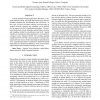Free Online Productivity Tools
i2Speak
i2Symbol
i2OCR
iTex2Img
iWeb2Print
iWeb2Shot
i2Type
iPdf2Split
iPdf2Merge
i2Bopomofo
i2Arabic
i2Style
i2Image
i2PDF
iLatex2Rtf
Sci2ools
114
click to vote
ICASSP
2011
IEEE
2011
IEEE
SVM feature selection for multidimensional EEG data
In many machine learning applications, like Brain - Computer Interfaces (BCI), only high-dimensional noisy data are available rendering the discrimination task non-trivial. In this work, we focus on feature selection, more precisely on optimal electrode selection and weighting, as an efficient tool to improve the BCI classification procedure. The proposed framework closely integrates spatial feature selection and weighting within the classification task itself. Spatial weights are considered as hyper-parameters to be learned by a Support Vector Machine (SVM). The resulting spatially weighted SVM (sw-SVM) is then designed to maximize the margin between classes whilst minimizing the generalization error. Experimental studies on eight Error Related Potential (ErrP) data sets, illustrate the efficiency of the sw-SVM from a physiological and a machine learning point of view.
BCI Classification Procedure | Feature Selection | ICASSP 2011 | Optimal Electrode Selection | Signal Processing |
Related Content
| Added | 20 Aug 2011 |
| Updated | 20 Aug 2011 |
| Type | Journal |
| Year | 2011 |
| Where | ICASSP |
| Authors | Nisrine Jrad, Ronald Phlypo, Marco Congedo |
Comments (0)

